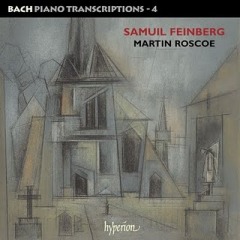Bach - Piano Transcriptions Vol. 4 - Samuel Feinberg
Bach - Piano Transcriptions Vol.4 - Samuel Feinberg

CD 1
Prelude and Fugue in E minor 'The wedge', BWV548
Trio Sonata in C major, BWV529 - Largo
Allein Gott in der Höh sei Ehr, BWV663
Allein Gott in der Höh sei Ehr, BWV711
Allein Gott in der Höh sei Ehr, BWV662
An Wasserflüssen Babylon, BWV653
Ein feste Burg ist unser Gott, BWV720
Von Gott will ich nicht lassen, BWV658
Wer nur den lieben Gott lässt walten, BWV647
Kommst du nun, Jesu, vom Himmel herunter, BWV650
Herr Jesu Christ, dich zu uns wend, BWV655
Jesus Christus, unser Heiland, BWV665
Nun komm, der Heiden Heiland, BWV659
Ach bleib' bei uns, Herr Jesu Christ, BWV649
Fantasia super Valet will ich dir geben, BWV735
CD 2
Concerto in A minor [after Vivaldi] RV522 BWV593
Martin Roscoe, piano
This fourth volume in our series of Bach transcriptions brings the first recording of the complete works in the genre by the hugely neglected figure of Samuil Feinberg. Feinberg belongs firmly in the grand tradition of the 19th-century pianist/composer that stretches from Chopin to Godowsky via Liszt and Busoni. Unfortunately his modernist compositional tendencies and the fact that he was Jewish led to his being sidelined within the Soviet regime, his ‘elitist’ music being rarely performed and his performing career constrained within the USSR. It is likely that his transcriptions were a creative response to the restrictions placed on his original music; no one could deny Bach his rightful place in the musical world and his organ music, from which all these works originated, was little known in Russia. No doubt Feinberg, the virtuoso, was also fascinated with the challenges of recreating the works pianistically as had Busoni before him, and it is to this composer that Feinberg’s transcriptional style can most easily be compared.
His earliest transcription, the Vivaldi/Bach concerto, is also his most superficially virtuosic; it’s interesting that thereafter his choice of music tends to come from Bach’s later output where his polyphony and harmonic language is at its most complex. These are magnificent realizations of works often still too little known in their original guise which will fascinate both for their pianistic ingenuity and their intrinsic musical worth. ---Christophe Sirodeau, hyperion-records.co.uk
Zmieniony (Środa, 18 Kwiecień 2012 19:12)








